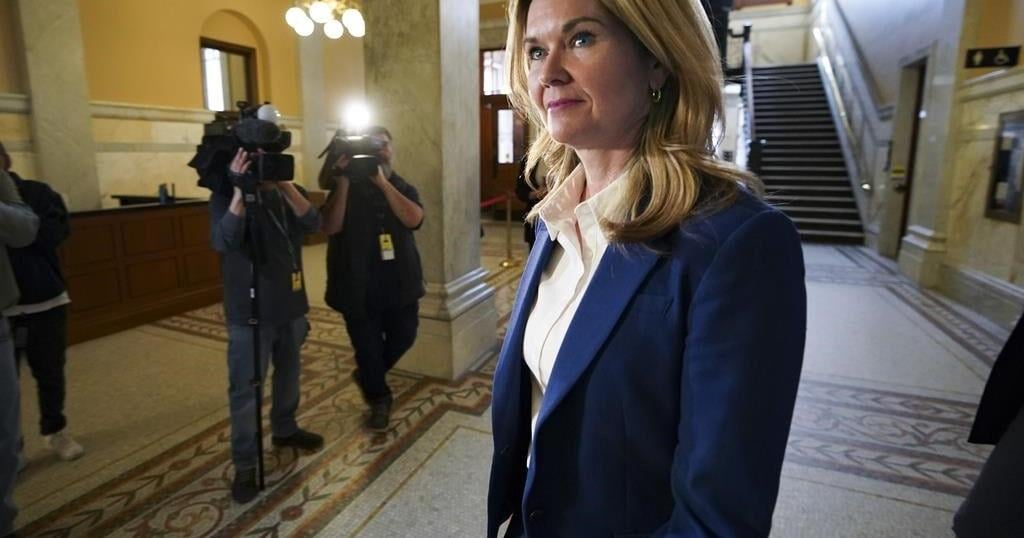TORONTO – An increasing number of Ontario school boards are reporting deficits and are using or even depleting their reserves, according to internal Ministry of Education briefing documents.
The association representing school boards in the province says while the Progressive Conservative government has boosted the education budget, increases have not kept pace with inflation, forcing boards to use money they were saving for large projects on operations or make cuts.
Education Minister Jill Dunlop has said that overall, school boards are in good financial health, but her transition binder – obtained by The Canadian Press through a freedom-of-information request – provides a deeper look.
“Sector wide, school boards are maintaining a healthy reserve level; however, some school boards have depleted/are projected to deplete their reserves over the course of the next few years,” the briefing documents say.
“Recent information suggested the number of deficit boards are on the rise, meaning more boards are starting to draw down on reserves.”
Historically, school boards have reported an overall surplus in their financial statements, but in recent years the number of school boards in deficit has risen, the documents say.
Eleven school boards reported an in-year deficit in 2020-21, a number that jumped to 31 boards in 2021-22 and decreased slightly to 29 school boards in 2022-23, according to the documents.
Ministry of Education officials recently told a legislative committee that currently, 31 boards are reporting in-year deficits of $200 million. One framed school board deficits as a result of accounting methods.
“Oftentimes, we just inherently think that a deficit is a bad thing, but a deficit just means that it’s money that’s set aside for a future purpose,” the bureaucrat said.
“Because of how the school boards account — they follow public sector accounting standard rules — the only way they can access these reserves is by incurring an in-year deficit. So it’s a bit of a complex accounting exercise, but it is no different than you and I putting money aside into a savings account, for example.”
But Kathleen Woodcock, president of the Ontario Public School Boards’ Association, said the impacts of deficits and using reserve funds are far reaching – citing narrower course offerings and cuts to services.
“If they keep dipping into their reserves or making cuts … the student impact is that students don’t have the best education opportunities that they would have if we didn’t have to use our reserves, or if we were properly funded,” she said.
“So some students are not going to be able to perhaps have the courses they need for their post-secondary education. It just becomes a big mess, and the solution is proper funding for the whole sector.”
A spokesperson for Dunlop said since 2018, the government has increased public education funding by 20 per cent and increased funding by 136 per cent to fix aging infrastructure and other capital expenditures.
“At a time when Ontario has provided school boards with record setting funds to support student education, boards should not be recording deficits,” Edyta MacKay wrote in a statement.
“Overall, school boards are in good financial health, with an accumulated surplus of $1.3 billion but we’re seeing a startling disconnect at some boards when it comes to financial management.”
The transition binder also provides a glimpse at some of the capital cost pressures facing school boards. The average age of schools is more than 40 years, the documents say, and renewal needs increase with time.
There is also no dedicated funding to modernize schools, the documents say.
“Boards can use some of their renewal allocation to support improvements but renewal funding is primarily focused on renewal/replacement of existing building components,” the briefing notes say.
As well, a moratorium on school closures is placing further strain on those budgets, with boards “spending their limited school renewal funding on maintaining and operating schools that may otherwise have closed,” the documents say.
In 2017, the Liberal government of the day put the moratorium in place while it reviewed the process of how closure decisions are made.
While the moratorium was intended to be temporary, it is still in place seven years later and there is no indication if the current government has completed the review.
The documents also note that the ministry is working with boards on “mitigation plans” around reinforced autoclaved aerated concrete, the same roof panels the government cited as the reason for abruptly closing the Ontario Science Centre.
The issue has not been accounted for in renewal needs, the documents say, but Woodcock, of the Ontario Public School Boards’ Association, said it does not seem to be a major problem so far.
“We’ve been hearing from our boards that there’s a relatively small number of schools within some boards that have this type of concrete and boards currently, they have budgets that can manage that kind of repair,” she said.
This report by The Canadian Press was first published Oct. 3, 2024.
